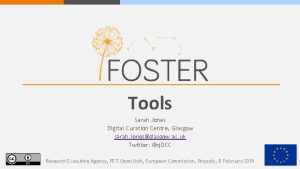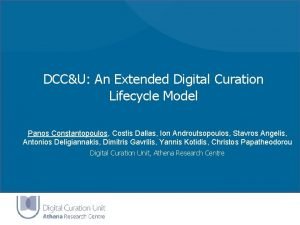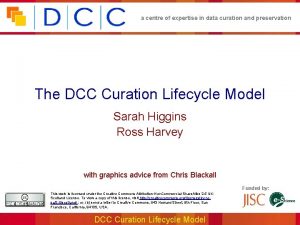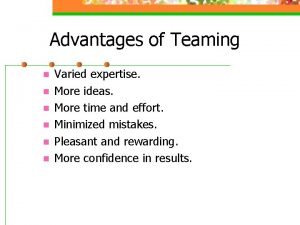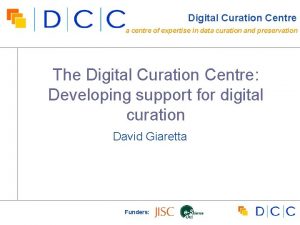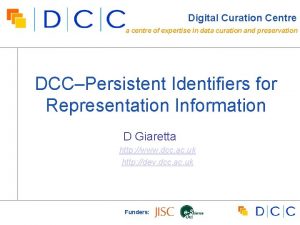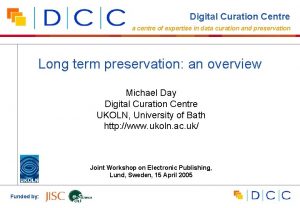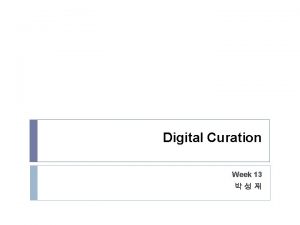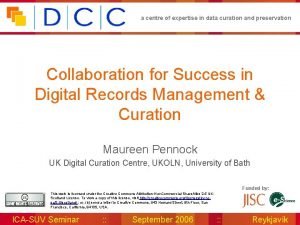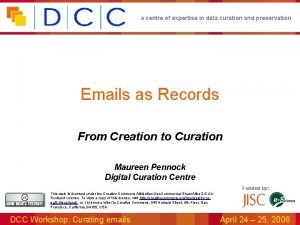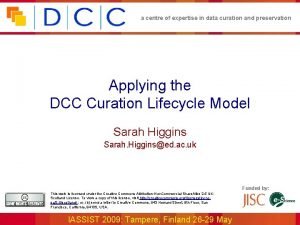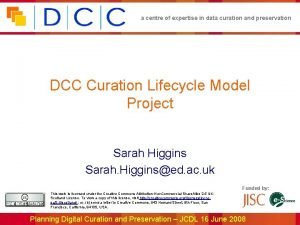Digital Curation Centre a centre of expertise in










- Slides: 10

Digital Curation Centre a centre of expertise in data curation and preservation Digital Curation Centre research agenda Michael Day Digital Curation Centre UKOLN, University of Bath http: //www. ukoln. ac. uk/ The Digital Curation Centre: a NIEe. S community awareness day, Centre for Mathematical Sciences, Cambridge, UK, 16 June 2005 Funded by:

DCC research – The DCC research team • Led by Professor Peter Buneman (School of Informatics, University of Edinburgh) • Distributed throughout all four DCC partner organisations • Strong links with other DCC components, through multi-team working, etc. – Links with other research groups • Visitors programme 2

Research goals (1) – To draw together the various functions of curation, from the traditional archival functions to the maintenance and publication of evolving knowledge as seen in scientific databases – To conduct research in areas already identified by the partners as crucial to digital curation 3

Research goals (2) – To identify through direct research collaboration, and through interaction with the service arm of DCC, the key projects in which research is needed – To institute two-way conduits between research and service in which practical issues can be drawn to the attention of researchers and the products of research can be tested in practice 4

Current priorities (1) – Data integration and publication • Review of techniques • Publishing data that conforms to a given format or schema – Performance and optimisation • Safe data analysis environments within data centres – Initial testbed based on sky survey databases (in collaboration with the Wide Field Astronomy Unit and Astro. Grid) 5

Current priorities (2) – Performance and optimisation (continued) • Automated metadata extraction and generation – Essential for testing the scalability of metadata-based preservation strategies – Review of tools, assessment of text mining techniques – Annotation • Survey of the forms of annotation • Annotation and provenance – A model for data transformations that maintains annotation and provenance 6

Current priorities (3) – Appraisal and long-term preservation • Appraisal techniques – Investigating the applicability and scalability of traditional appraisal techniques in 'data-intensive' contexts – Dynamic databases – Preservation techniques for evolving metadata and databases 7

Current priorities (4) – Socio-economic and legal contexts • Networks of trusted repositories – Varying preservation role for repositories – Roles for co-operation, exchange formats, replication, etc. • Economic cost-benefit analysis of curation processes – Quantifying costs and benefits – Testing economic viability of curation processes 8

Current priorities (5) – Socio-economic and legal contexts (continued) • Rights and responsibilities – The legal contexts of curation, e. g. impacts of the Database Directive – Complexity of rights held in databases, impacts on aggregation and reuse of data 9

Further information – Digital Curation Centre Web site: http: //www. dcc. ac. uk/ – Contact: research@dcc. ac. uk 10
